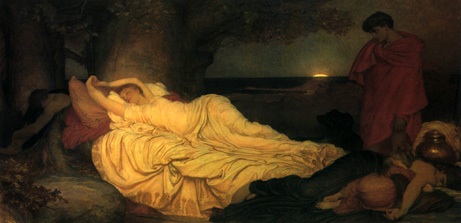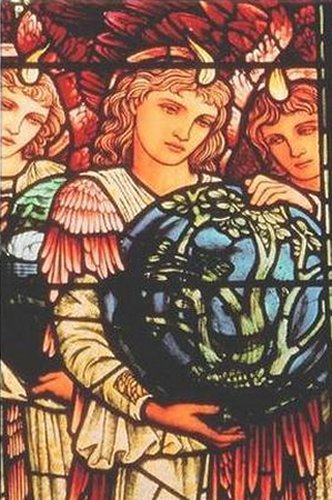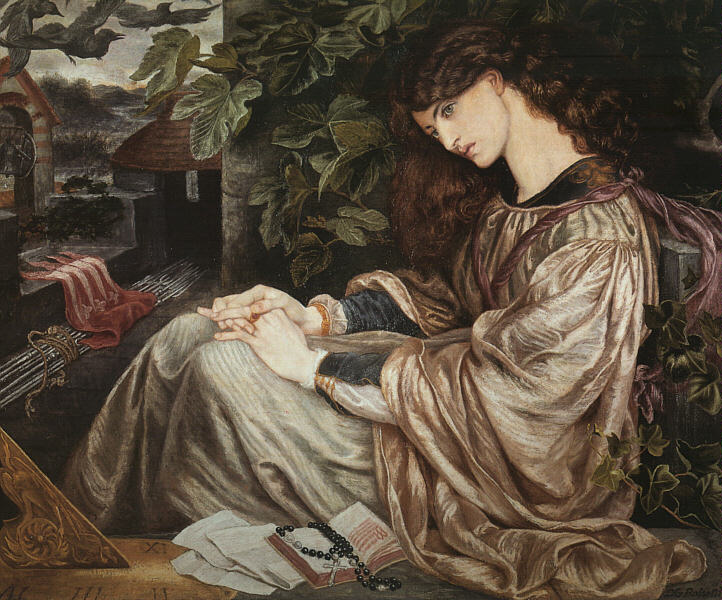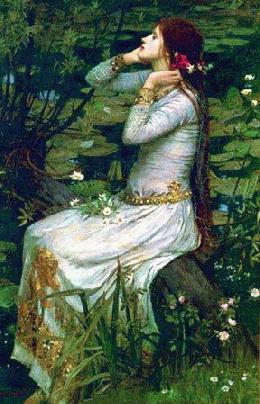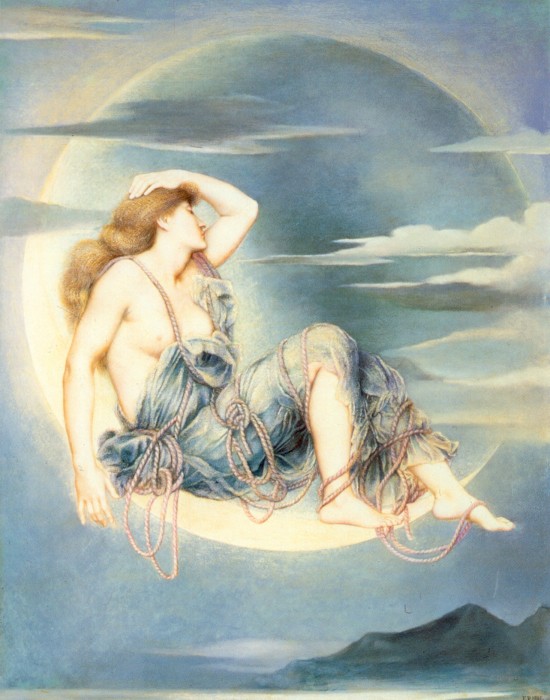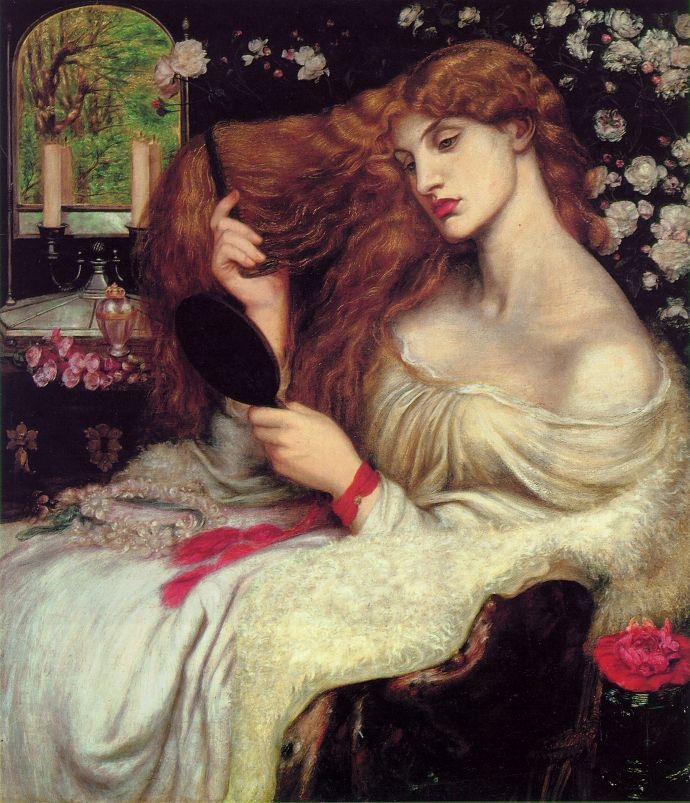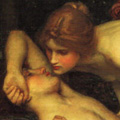where Jesus tends His flame against the night.
by Mary Rae, written as a friend to a friend in 2006
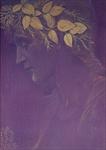
Talent
for Kevin Nicholas Roberts
I liked the first passage
of her poem—where it led
(though not nearly enough
to retract what I said.)
Now the book propped up here
flutters, scarcely half read.
It will keep.
Before sleep,
let me read yours instead.
There's something like love
in the rhythms of night
—in the throb of streets
where the late workers drone,
in the sounds that attend
each day’s sad, squalid end—
that reminds us: till death
we are never alone.
So we write from the hearts
that will fail us anon,
words in red
truly bled
though they cannot reveal
whence they came,
who they're for.
And the tap at the door
goes unanswered. We write,
for there is nothing more
than a verse,
than a song,
than this chant of the blessed:
If these words
be my sins,
let me die unconfessed!
Unconfessed, unrepentant;
I rescind all my vows!
Write till sleep:
it’s the leap
only Talent allows.
by Michael R. Burch, written in 2000 after a discussion about the work of another poet;
Kevin seemed to like this poem and requested it more than once in later
conversations
 On the Death
of Kevin Roberts
On the Death
of Kevin Roberts
The winter sky reflects my frozen tears
As cold earth ushers home her fairest child
Whose silenced voice rings through the hollow years
Like stillborn poems scattered on the wind
His spirit kissed my soul with verses wild
As freeborn streams that leap through April meads
Where doomed Ophelia strangled in the reeds
As blacktoothed sorrow ate away her mind
'Til life no longer offered hope or joy
Now April fields lie barren 'neath the snow
And cruel December seals the stream in glass
Her gath'ring shadows hasten to destroy
All traces of the beauty that did pass
With songs of love and loss that seemed to flow
On wings of angels from a source Divine
Like Hamlet's maide, her poet's voice is stilled
His Orphic lute a relic pawned to Time
The liquid words to which my spirit thrilled
No longer match their meter to his heart
Trailing his soul to some celestial clime
And bathing Heaven in eternal light
—
I strain to catch the echo of their flight
As they from earth and mortal ear depart
Sing out! ye verses 'til those frozen skies
Rain down thy praises like December snow
And on the frigid north wind burn his name
Go tell the world her noblest poet dies
Blow! Blast the world on wings of fire and flame
'Til ev'ry tree and brook and star shall know
A loss as fierce and ravenous as mine
by Michael Pendragon
 Kevin Roberts*
Kevin Roberts*
I’ve walked in fairy realms where star streams glide,
Where silver rills reach rivers few have seen
That wind their way through verdant forest green.
Here beauty and all magics yet abide,
And here is where, in great delight, I’ve spied
Sloe-eyed wan women fallen, or pristine,
Whose kiss may be angelic or obscene,
And in my dreams each is my secret bride!
No one but him has held the key, or keys,
To open dream gates of profoundest joy,
No one but him has conjured, dared to please,
Called Helen, Circe, or the gods of Troy.
His artistry is Love, and no facade,
His poetry touched by the hand of God.
* lines written by Michael Fantina which were read at Kevin Roberts’s funeral service
 Savage Stars
for Kevin Roberts
Savage Stars
for Kevin Roberts
His words dance to an inner drum
From doe-eyed Sirens in bazaars,
Sound like some magic pendulum
Set swinging by lost avatars.
Like rare aloes and galbanum,
Like red and molten silver bars,
And plates of hammered platinum,
His words like gold from savage stars!
by Michael Fantina
 Siren Songs*
Siren Songs*
for Kevin Roberts
Verse beyond compare,
Warm, seductive lair,
Women wan and fair,
Who love or slay.
Sirens sing and snare,
Lure with golden hair,
Down some spiral stair,
All fears allay.
Each poem is a prayer,
Breathed in heady air,
Beauty to ensnare,
Spellbound bouquet.
Each poem a thoroughfare
Of day dream or nightmare
Where dwell sweet Siren women of the fey.
* written by Michael Fantina upon reading Kevin Roberts' FATAL WOMEN
 A Poem Written Almost Irresistibly while
A Poem Written Almost Irresistibly while
Reflecting on Fatal Women by Kevin Roberts
His poetry so like the law
Of fatal flutes whose sound is grace,
Sweet magic words, no fatal flaw,
Nor any lines in each sweet face.
Women with long curling tresses,
Their fatal fingers on my arm.
Lips that rain Circe's caresses,
Their glance a breathless, fatal charm.
Seductive stare and fatal glance,
Fey lover but too quickly gone.
I dream a fatal fairy dance,
That conjures swift oblivion.
Ah, women fey and Sirens all,
With fatal eyes and fatal smiles,
Each poem a sacred madrigal,
Across a thousand fatal Niles!
Love is both true and yet a lie!
Fall fatal petals from the rose,
The heart heaves with a fatal sigh
So chilled by fatal falling snows.
We sit beside this fatal stream,
The Moon and fatal stars align;
Ah, fatal is this fatal dream,
I drink these poems like fatal wine!
by Michael Fantina


Click below for a piece for flute by Mary Rae, dedicated to Kevin Roberts



Artwork by Dante Gabriel Rossetti, John
William Waterhouse, Edward Burne-Jones,
Lord Frederic Leighton, Sir Lawrence Alma-Tadema and Evelyn De Morgan





Related Pages:
Romantic Poetry Timeline,
Free Verse Timeline
